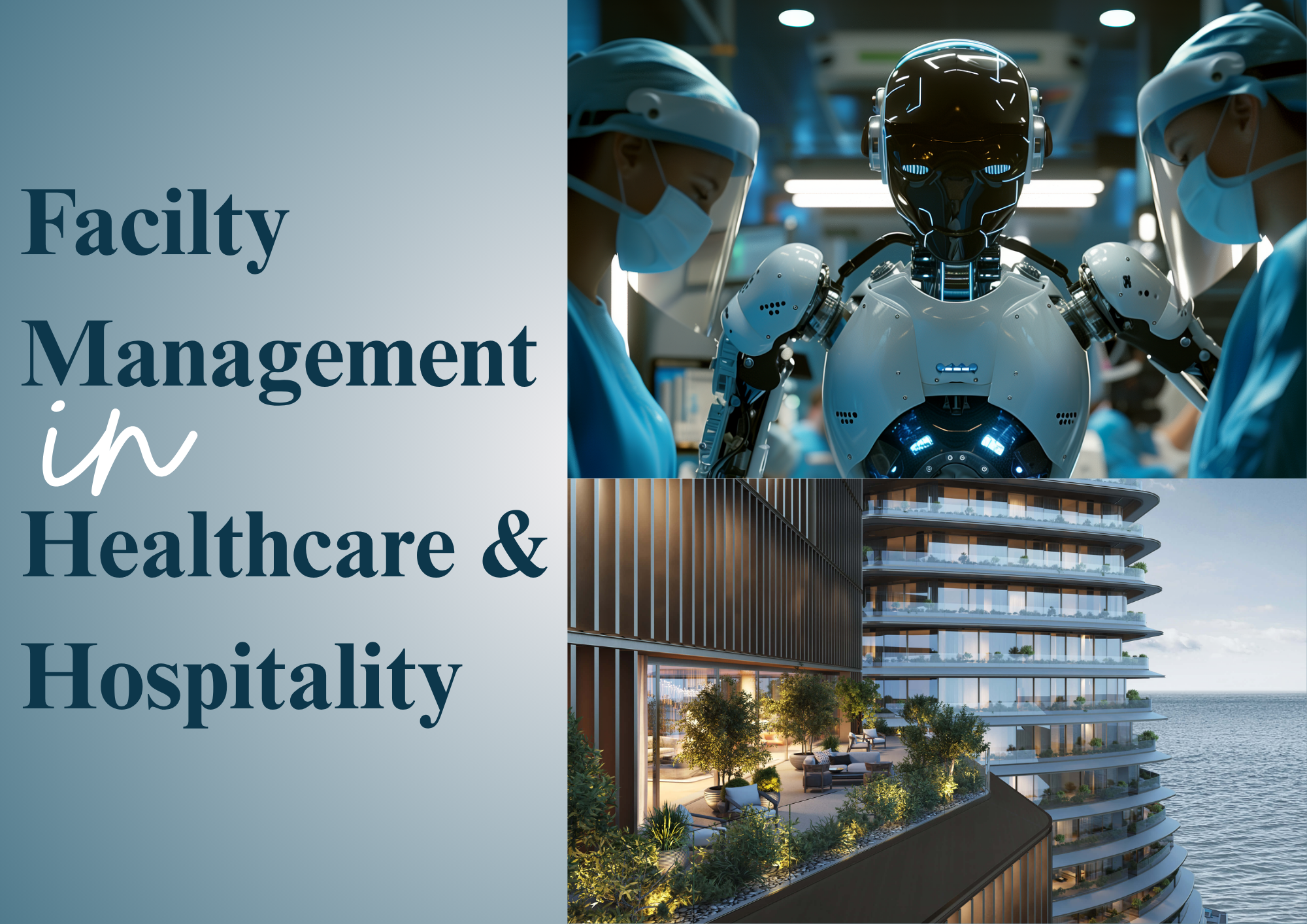Introduction: How Facility Management is Transforming Healthcare & Hospitality in Saudi Arabia
In today’s fast-paced world, facility management (FM) has evolved into a critical component for sectors that demand operational excellence—healthcare and hospitality. In Saudi Arabia, these industries are rapidly expanding under Vision 2030, creating a strong need for professional FM solutions that ensure safety, compliance, and an exceptional experience for patients and guests.
Saudi Vision 2030 elevates facility management as a strategic pillar, fueling infrastructure worth over USD 1.3 trillion under development, and making FM essential for operational excellence across healthcare and hospitality sectors
The Healthcare Sector Transformation Program (under Vision 2030) focuses on universal coverage, digitalization, and public‑private partnerships—paving the way for advanced FM integration into hospitals and wellness facilities. Read more: Read more:
How Vision 2030 is Transforming Healthcare in Saudi Arabia
The healthcare and hospitality sectors are at the heart of Saudi Arabia’s Vision 2030, which aims to build a world-class service economy driven by innovation, efficiency, and sustainability. Both industries demand operational excellence, hygiene, and guest satisfaction, making Facility Management (FM) a critical enabler. From infection control in hospitals to luxury comfort in hotels, FM is evolving with AI-driven tools, smart technologies, and green solutions to meet these ambitious goals.
Saudi Vision 2030: Why FM is a Strategic Priority
Why Facility Management is a Strategic Priority?
Saudi Arabia’s Vision 2030 is a national blueprint to diversify the economy, boost non-oil sectors, and position the Kingdom as a global hub for tourism, healthcare, and sustainability. Facility Management (FM) plays a critical enabling role in achieving these goals because it ensures operational efficiency, safety, and sustainability across infrastructure megaprojects.
Key Vision 2030 Programs Linked to FM
-
Healthcare Sector Transformation Program
-
Objective: Provide universal health coverage and improve quality of care.
-
FM Role: Infection control, advanced cleaning, HVAC optimization, and digital facility monitoring for CBAHI compliance.
- New trends: Virtual hospitals (e.g., Seha Virtual Hospital), AI diagnostics, telemedicine—FM ensures hygiene & operational readiness.
-
-
Quality of Life Program
-
Objective: Improve living standards and hospitality experiences for residents and tourists.
- FM Role: Premium housekeeping, maintenance of parks, resorts, and entertainment venues to deliver world-class guest experience.
-
-
Tourism Development Program
-
Goal: Attract 100 million visitors annually by 2030.
- FM Role: Maintain luxury hospitality assets in NEOM, Red Sea Project, Amaala, and Riyadh metro hubs.
-
-
Energy Efficiency Program
-
Focus: Reduce energy consumption in buildings by 30–40%.
- FM Role: Smart BMS, predictive HVAC controls, LED retrofits, and IoT-based energy monitoring.
-
Market Impact
-
Saudi FM Market Size: USD 27 billion (2024) → projected to hit USD 60 billion by 2033 (CAGR 10.5%). Read More:
AI Facility Management in Saudi Arabia 2025: Growth Insights & Smart Solutions
-
Key Growth Sectors: Healthcare, hospitality, commercial real estate, education, and entertainment.
-
Trend Shift: From reactive maintenance to digital, CAFM-powered predictive maintenance for operational excellence.
Advanced FM Techniques in Healthcare
-
Advanced FM Techniques in Healthcare
Saudi’s launch of the world’s first AI doctor clinic in Al Ahsa introduces “Dr. Hua,” an AI‐based virtual physician diagnosing and prescribing treatments across multiple conditions—with review by human doctors.
Explore more:
Health Care in Saudi Arabia – Wikipedia
-
Seha Virtual Hospital (SVH)
The Kingdom’s first virtual hospital connects 224 hospitals, 44 specializations, enabling remote monitoring, emergency support, and home care—enhancing facility-wide coordination and patient flow management.
Explore more:
Ministry of Health (Saudi Arabia) – Wikipedia
-
Remote Monitoring & Edge Computing
Use of IoT wearables, AI and edge/fog computing helps monitor patient vitals and hospital facility performance in real time—minimizing risks and optimizing operations.
Explore more:
AI in Healthcare: arXiv Research Paper (2004.07311)
-
Drone-assisted Asset Disinfection
Especially post‑pandemic, drones are being trialed for disinfecting external hospital assets—improving efficiency, safety, and reducing manual workloads.
Explore more: https://arxiv.org/abs/2212.01445
-
AI in Energy & HVAC Optimization
Machine learning models are used to predict energy consumption patterns in hospital buildings and fine-tune HVAC usage—leading to up to 25% energy savings and improved patient comfort
Explore more: https://arxiv.org/abs/2311.15807
Hospitality FM: Taking Guest Care to New Heights
-
Luxury tourism projects
like NEOM, the Red Sea Project and Amaala include hotels with integrated FM systems aligned with high sustainability standards and eco‑friendly operations
-
Mandatory hospitality deregulation
such as abolishing hotel licensing fees from September 2024, fuels sector growth and opens opportunities for up‑market FM services
Read more:
-
Hospitality in hospitals
blends FM, patient experience, and guest comfort: clinics offer enhanced hygiene, better room décor, healthy meals and ambient settings to support healing and well‑being
Read more:
Saudi Arabia Focuses on Hospitality Services in Hospitals
Why These Advances Matter
Hospitality FM: Creating World-Class Guest Experiences
-
Regulatory compliance (e.g. CBAHI certification) and infection control are upheld via digital monitoring, AI diagnostics, disinfection automation, and real-time alerts.
-
Guest/patient experience is enhanced through predictive maintenance, energy-efficient comfort, AI service personalization, and the luxury‑level hospitality integrated into facility operations.
-
Operational efficiency is increased through predictive analytics, central CAFM systems, and reduced energy and manpower costs.
Conclusion
Facility Management is no longer just an operational function—it is the backbone of Saudi Arabia’s Vision 2030 for healthcare and hospitality. With the rise of AI-driven CAFM systems, smart energy solutions, and infection control technologies, FM ensures compliance, efficiency, and sustainability across critical sectors.
As the Kingdom invests in world-class hospitals, luxury resorts, and smart cities, the demand for integrated facility management will only accelerate. Embracing advanced FM practices guarantees performance, transparency, and cost-effective solutions tailored for the future of healthcare and hospitality in Saudi Arabia.


